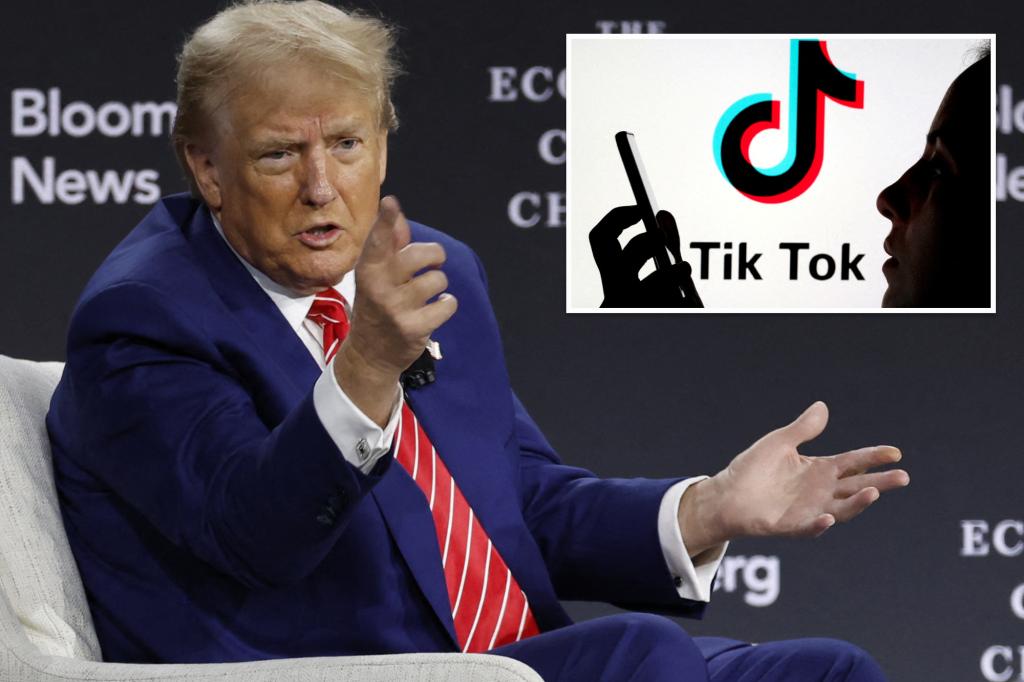Former President Donald Trump has defended his change of opinion regarding the potential banning of TikTok, stating during a Q&A session at the Economic Club of Chicago that he sees TikTok as a threat but recognizes that many things pose threats in the digital world. He compared the platform to other tech giants like Google, indicating that while he may not be a fan of these companies, destroying them could have negative consequences. This marks a shift from his previous stance where he signed an executive order outlawing transactions between TikTok’s parent company ByteDance and US citizens on national security grounds.
After initially supporting legislation to force ByteDance to divest itself of TikTok within nine months, Trump has since expressed concerns about the implications of such a move, citing potential First Amendment issues and other problems related to the platform. Speculation suggests that GOP megadonor Jeff Yass may have played a role in persuading Trump to reconsider his stance on the ban. Despite widespread Republican support for the legislation, Trump’s wavering position on TikTok reflects broader debates surrounding the platform’s ties to the Chinese Communist Party and the potential risks associated with the data it collects from millions of US users.
One of Trump’s concerns regarding a TikTok ban was the potential for Meta, his least favorite platform, to gain more market share in the absence of TikTok in the US. By joining TikTok in June and attempting to engage younger voters who were opposed to the divestment bill, Trump’s actions underscore the political implications of decisions related to social media platforms. The broader context of the debate surrounding TikTok includes fears that the Chinese government could access sensitive data collected by the platform and use it for propaganda purposes, raising national security concerns among lawmakers and policymakers.
Trump’s comments highlight the complex nature of navigating the intersection of national security concerns, economic interests, and free speech considerations when it comes to regulating social media platforms like TikTok. In a digital landscape where the boundaries between privacy, security, and corporate influence are constantly shifting, policymakers face difficult choices in balancing these competing interests. Trump’s evolution on the TikTok issue reflects the broader challenges of adapting to the realities of a rapidly changing technological environment while addressing the geopolitical implications of foreign-owned platforms operating in the US.
As discussions around TikTok continue to evolve, the role of political actors, influencers, and industry stakeholders in shaping the debate remains significant. Trump’s engagement with TikTok as a political tool to reach new audiences underscores the platform’s growing influence in public discourse and the need for policymakers to engage with these platforms in a strategic and informed manner. The ongoing tensions between national security imperatives, economic considerations, and individual rights in the digital domain highlight the complexities of regulating global technology platforms in an interconnected world where information flows across borders and shapes public opinion in ways that are not always transparent or easily controlled.
Ultimately, Trump’s back-and-forth on the TikTok issue reflects the broader challenges of governance in a digital age, where the rapid pace of technological change and the global nature of online platforms present new dilemmas for policymakers. As debates around data privacy, national security, and the regulation of tech giants intensify, finding a balance between competing interests will require nuanced approaches that take into account the complexities of the digital ecosystem. Trump’s shifting stance on TikTok serves as a case study in the complexities of navigating the intersection of politics, technology, and national security in an increasingly interconnected world where decisions made in one domain can have far-reaching implications across multiple spheres.


